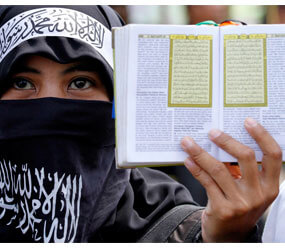VATICAN CITY – A U.S. pastor’s threat to burn copies of the Quran has damaged the image of the United States, said the U.S. ambassador to the Vatican.
“The deliberate destruction of any holy book is an abhorrent act,” said the ambassador, Miguel H. Diaz.
Plans by a small Florida Pentecostal church to burn the Quran Sept. 11 represent “disrespectful acts” and in no way reflect “the sentiments of the American people or the U.S. government,” he said in a written statement Sept. 10.
The ambassador’s remarks came after the Florida pastor, the Rev. Terry Jones, announced he had called off the event, even though later he said he was going to “rethink” that decision.
“The U.S. government condemns the on-again, off-again plans” by the small evangelical group, Diaz said. “The mere threat by a pastor of a small Florida church has already damaged the image of the U.S.”
Diaz’s comments were the latest in a series of condemnations by international church leaders and officials.
Catholic bishops in Iraq and Pakistan joined a growing chorus of international religious leaders denouncing the planned burning.
Chaldean Catholic Bishop Shlemon Warduni, the auxiliary of Baghdad, told Catholic News Service the proposed act “is totally against the spirit of Christianity.”
He said people in Iraq, particularly Muslims, are asking: “Why are the Christians doing this?”
Bishop Warduni said Rev. Jones, of the Dove World Outreach Center in Gainesville, Fla., “must know and understand the consequences for Christians all over the world: Violence brings violence, not peace.”
Chaldean Archbishop Louis Sako of Kirkuk, Iraq, issued a statement about the burning planned for Sept. 11, which this year coincides with the three-day celebration of Eid al-Fitr, the end of Ramadan, the Muslim month of fasting.
“We condemn this act as irresponsible and immoral, an act of violence against the Islamic religion but also all religions,” Archbishop Sako said. “The pastor’s position is his own and does not in any way, shape or form represent the position of Christians.
“While we assure you of our solidarity in condemning this despicable act, we also believe that it is incumbent upon all of us to work together, hand in hand, to renounce fanaticism and violence, which constitute the greatest threat to religion,” he said.
In a statement Sept. 9, the Pakistani bishops condemned the planned Quran burning and urged the U.S. government to stop it.
Archbishop Lawrence Saldana of Lahore, president of the Pakistan Catholic Bishops’ Conference, “denounced it as (an) act of desecration that is totally contrary to the Christian teaching that stresses tolerance and respect for sacred books of other religions.”
“I call upon the American government to stop this senseless and insane plan because it injures the feelings and sentiments of our Muslim brethren and will seriously damage interfaith relations and peace throughout the world, especially in Pakistan,” he said.
The statement also pointed out that “this outrageous gesture has been unequivocally denounced by the Vatican and other world leaders.”
In a Sept. 8 statement, the Vatican’s Pontifical Council for Interreligious Dialogue said the “deplorable acts of violence” of Sept. 11, 2001, “cannot be counteracted by an outrageous and grave gesture against a book considered sacred by a religious community.”
In Lebanon, the Catholic Church and all the evangelical churches condemned “completely this attack against the Quran,” Maronite Father Joseph Mouannes, secretary of the Commission for the Catholic Bishops of the Middle East, told Catholic News Service.
As Christians, Father Mouannes said, “we have to respect the beliefs of other religions and other societies. Our Gospel doesn’t permit hate and condemnation against people. The core of the Gospel is respect and forgiveness.”
“Imagine what damage he (Jones) can do for Christian minorities in the Islamic world,” he added. “We have to think of all the Christian people in the Islamic world, especially, in the Middle East.”
Father Mouannes echoed a warning by Gen. David Petraeus, the top U.S. military commander in Afghanistan, that the proposed Quran burning represents a very clear danger for American soldiers.
On Sept. 1, Cardinal Oswald Gracias of Mumbai, president of the Catholic Bishops’ Conference of India, said the plan was a “totally insensitive and disrespectful act” and was “all the more shocking because such a campaign goes totally contrary to the teachings of Jesus Christ.”
In Indonesia the same day, Bishop Petrus Mandagi of Amboina and Bishop Johannes Pujasumarta of Bandung met with Muslim, Christian, Buddhist, Confucian and Hindu leaders in Jakarta.
“We are deeply hurt by this group’s plan to harm a religious symbol which is highly respected by Islam,” the Indonesian bishops said in a statement at the meeting. “We strongly denounce the plan and any similar action committed by any party elsewhere.”


